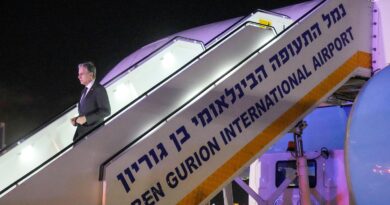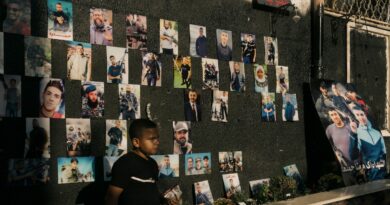Palestinian government resigns in step toward post-Gaza war overhaul
The move came amid high tensions not only in Gaza but on Israel’s border with Lebanon where Israeli fightermade their deepest bombing runs into the country since the conflict began. At the same time, negotiations in Qatar continued over a possible cease-fire and hostage exchange.
Prime Minister Mohammad Shtayyeh said in a news conference Monday that he had tendered the government’s resignation to Palestinian Authority President Mahmoud Abbas because of the “significant political, security and economic developments” stemming from Israel’s war in Gaza alongside increased violence in the West Bank and Jerusalem.
“The next phase and its challenges require a new government and political arrangements that take into account the new reality in the Gaza Strip, national unity and the urgent need for achieving inter-Palestinian consensus,” he said.
The move follows months of intense deliberations between Ramallah, Washington and Arab states, on how best to boost the legitimacy and efficiency of the Palestinian Authority so it can be part of a postwar solution in Gaza.
The consensus has converged on a vision for an empowered prime minister role and government of technocrats, with a curb on some of the absolute unchecked power that have accumulated around 88-year-old Abbas, according to U.S. and Palestinian officials.
But major stumbling blocks remain: Israel has said it will not accept Palestinian Authority rule over Gaza in any postwar scenario and has vehemently opposed calls from the United States for a Palestinian state. And there is skepticism regarding how much Abbas will be willing to relinquish power or enact any deep overhaul that go beyond a change of faces in a government.
“If Abbas continues to appoint people, continues to dismiss people, where is the change exactly?” said Nasser al-Qidwa, a longtime senior Fatah official now living in exile after breaking with Abbas. If the resignation is accepted, it will be “the same government with a different chapeau.”
The future of the Palestinian Authority — meant to one day evolve into the institutions of a Palestinian state — has been a subject of intense debate between the Israelis and its U.S. ally.
Shtayyeh criticized Israeli efforts to transform the authority into an administrative and security entity “devoid of any political significance” and dismantle the United Nations Relief and Works Agency, which oversees aid for Palestinian refugees.
In Israeli Prime Minister Benjamin Netanyahu’s “day-after” plan for Gaza, he sees it governed by “local entities with managerial experience,” leaving open the possibility of a role for a watered-down version of the authority. The Palestinian Authority administered Gaza until Abbas’s Fatah party lost elections in 2006, and Hamas seized control during bloody clashes.
The authority was set up 30 years ago as part of the Oslo accords between Israel and the Palestine Liberation Organization; it was supposed to be an interim body with a five-year mandate as a Palestinian state was negotiated.
But it has struggled to operate under Israeli occupation, even though it has some of the trappings of government. Its reputation has been damaged by its security cooperation with Israel, leading it to be seen in the eyes of some Palestinians as a tool of the occupying power.
The announcement comes as talks resume in Doha, Qatar, to try to reach a deal on the release of more than 100 remaining Israeli hostages in exchange for a cease-fire. An Israeli delegation has arrived for the discussions, which are “lower-level technical talks,” said one Western diplomat who spoke on the condition of anonymity because of the sensitivity of the negotiations. He said there was “not much optimism” that they would bring progress.
Benny Gantz, a member of Netanyahu’s war cabinet, has said that if the hostages are not released by the Muslim holy month of Ramadan — which begins around March 10 — Israel will expand its assault on Gaza to the southern city of Rafah.
Washington and other allies have urged Israel to hold off a military assault until the safety of the more than a million civilians that have fled to the area can be ensured.
Diplomats have also expressed concerns that the lack of a truce deal in Gaza could increase the risk of an expanded regional conflict, as Israel and Hezbollah enter a cycle of escalation. Hezbollah, the Iranian-aligned paramilitary that is also Lebanon’s most powerful political group, has tied its participation in any negotiations to temper border tensions to a cease-fire in Gaza.
But the tit-for-tat border crossfire continues to expand, and the Israeli military said its warplanes had struck Hezbollah air defenses in the Bekaa Valley on Monday in response to the downing of an Israeli drone by the group’s air defense.
In posts on social media, Israel’s military said it deployed fighter jets to strike targets “deep inside Lebanon” that it said were being used by Hezbollah militants as air defense sites. A spokesperson for Hezbollah said that two of its members were killed in the strike.
In comments on Sunday, Israeli Defense Minister Yoav Gallant said more strikes were planned against Hezbollah, especially if there was a cease-fire in Gaza.
“If a temporary pause is reached in Gaza, we will increase the fire in the north separately, and will continue until the full withdrawal of Hezbollah [from the border] and the return of Israeli citizens to their homes,” he said.
Leo Sands in London and Sarah Dadouch in Beirut contributed to this report.




